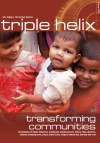To many observers the Millennium Summit at the United Nations this September was a farcical waste of time in terms of fighting global poverty and seeing the Millennium Development Goals (MDGs) properly supported.[1] Governments and NGOs, all fighting their own corner, effectively hamstrung efforts to fight poverty. One of these destructive lobbies was the pro-choice movement.
The fifth MDG resolves to reduce maternal mortality by three quarters by 2015,[2] and is closely related to the third and fourth goals, which seek respectively to eliminate gender disparity in primary and secondary education and reduce by two thirds the mortality rate among children under five. The shocking levels of maternal and infant mortality around the world are actually getting worse, not better, and so the fourth and fifth MDGs look some of the least likely to be met.[3]
Yet in the midst of lobbying for increased access to good quality obstetric services for the poor, better education for girls, access to and teaching about contraception and challenging social attitudes that disempower women and girls, another argument has crept into the debate, almost under the radar. Several groups including the International Planned Parenthood Federation (IPPF) have argued that increased access to reproductive health includes access to abortion services.
While no one could reasonably argue against a woman's right to be free from abuse, fear of death and injury from the preventable complications of childbirth and pregnancy, there must be questions raised about the imposition of dubious Euro- American values towards sexuality and attitudes to the unborn that lie behind this Western pro-choice agenda. Furthermore, the resources put into developing abortion services could easily detract from those other, more directly effective measures in tackling maternal and child health.
At the same time, The UN has made it clear that the term 'reproductive health' does not include abortion services.[4] The IPPF and others are fighting a battle, which is at best irrelevant, and at worst a hindrance to the wider task of fighting global poverty and health inequality.
In fighting for the poor and disempowered as Christians [5] we should be promoting 'a culture of life rather than death' (as Pope John Paul II coined it).We should be standing up for the weak and disempowered, rather than letting a new form of neo-colonialism threaten the very lives we seek to save.
































